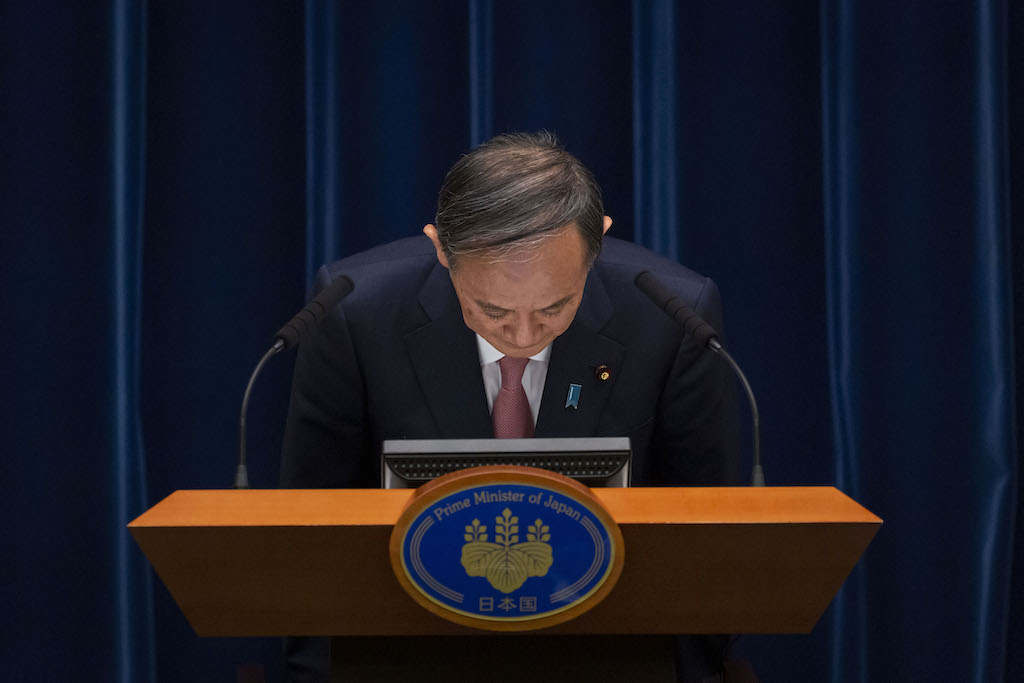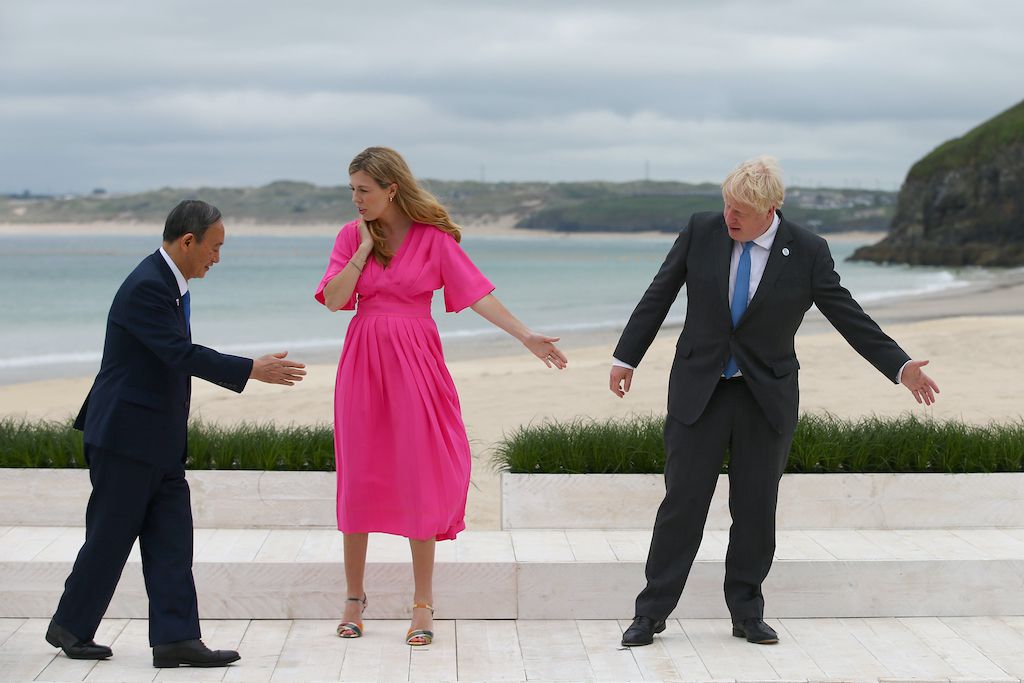The danger of return to short-termism
After the longest-ever tenure of Shinzo Abe, Japan faces a possible return to the era of short-term prime ministers. Whether or not Yoshihide Suga remains in charge after the upcoming elections, Tokyo must give more emphasis to future planning.

In a nutshell
- Japan’s prime minister is not expected to last for long
- The country’s unique governance system provides stability
- Japan’s ability to plot longer-term strategies has been poor
Few things are certain in Japanese politics, as the intricate goings-on in Nagatacho, the seat of government in Tokyo, are notoriously secretive and conspiratorial. But we do know that for some time to come, Japan will not have a prime minister of the same status and political longevity held by Shinzo Abe, who led the Japanese government for nine years.
Mr. Abe’s successor as leader of the Liberal Democratic Party (LDP), Yoshihide Suga (age 72), is not likely to last in office more than a couple of years, and perhaps even not that long. And among the country’s political talent, no one in sight could match Mr. Abe’s personality and political skills. It is not for nothing that there are people in the LDP who already want the former leader to come back.
We do not know whether Japan will return to the era of one- or two-year prime ministers, but the prospects are of interest to the Japanese electorate and the wider world. A return to Japanese short-termism would come precisely when a new world power, China, is demonstrating its obsession with long-term ambitions and long-term trends. Chinese leader Xi Jinping is a man of grand designs. He has made the ruling communist party agree to abandon term limits for the country’s presidency, and has already set the country’s sights on 2049, when the Communist Party of China (CPC) hopes to celebrate a century in power.
Washington brings relief
From Tokyo’s perspective, the change in Washington from the administration of President Donald Trump to that of President Joe Biden has brought welcome relief. On one hand, the deliberate uncertainty in which Mr. Trump had kept the Japanese and his good friend Prime Minister Abe has been removed swiftly by the Biden team. At one moment, Tokyo had even been in the dark about whether the United States would come to the aid of its oldest ally in Asia in an emergency, such as a Chinese occupation of the Senkaku Islands. Furthermore, Tokyo must be pleased that President Biden is showing a determination to make the containment of Chinese power an important goal for the Western alliance. With its engagement in the Group of Seven (G7) and the Quadrilateral Security Dialogue (QUAD), Japan demonstrates its commitment to Washington’s China policy.
Tokyo does not want to hurt Japan’s thriving trade with China.
On both sides of the Pacific, there is consensus on taking a tougher stance toward China. Japan and the U.S. agree that Beijing must be made to observe international rules, committing to more transparency and to the principle that democracies must stand firm against authoritarian regimes such as China or Russia.
China observers might, however, detect some degree of variation when it comes to language and actual actions. It is obvious that Nagatacho is more cautious than Washington. That is not only due to Japan’s geographic location. There is a lot at stake for “Japan Inc.” – an informal term for Japan’s highly centralized economic system with a close relationship between the government and private sector. Even during the Covid-19 crisis, Japan has seen its China business flourish, and Japanese exports to mainland China have shown healthy growth. Japan has been able to prevent too drastic a fallout of the pandemic on its economy, mainly due to an excellent performance of the export industry. Tokyo certainly does not want to upset such a thriving relationship.
Elections are near
From the start of his term as prime minister, it has been clear that Mr. Suga will not stay for long. The next general elections to the lower house of the National Diet (Japanese parliament) must be held before October 22, 2021, as the previous elections took place on that date in 2017. Early on, Mr. Suga, who took over the reins of the Japanese government after the resignation of Shinzo Abe in September 2020, promised to hold the general election before his term as LDP president runs out on September 30th, 2021. In the meantime, the prime minister seems to have moved away from this plan, and now it looks certain that the general elections will take place closer to the October deadline.
The mood of the Japanese electorate tends to be volatile when considering opinion surveys. According to pollsters, the prime minister had a relatively promising start; yet his ratings dropped considerably following controversies over his handling of the Covid-19 crisis and the decision to go ahead with the Tokyo Olympics. With a splintered opposition that lacks any leader with a national profile, even a low approval rating is no serious threat to the LDP continuing in power. The question will be whether the influential LDP faction heads will deem it safer to enter the elections with a new party leader.
Intense rivalry
A glance at history is in order to explain the process. The historic success of the LDP – a party that has been in power practically the entire time since its founding in 1955 – is rooted in its structure: it encompasses various factions. Typical parties do not like to harbor rival factions, for fear of centrifugal forces tearing them apart, but in the LDP, factions have been institutionalized. The party caucus is composed of factions with their leadership and own programmatic profiles. The main advantage of this setup is the LDP can cater to large segments of the electorate, both in terms of issues and personnel. By affiliating with a faction, a young representative can carefully plan his career in politics.
Shinzo Abe mentioned some LDP stalwarts as candidates to succeed Mr. Suga.
Mr. Suga, who had been Prime Minister Abe’s trusted lieutenant as longtime chief cabinet secretary, enjoyed the support of several factions without belonging to the most powerful one, led by Deputy Prime Minister Taro Aso. Mr. Aso had supported Mr. Suga’s election, and his continued support will be crucial.
Recently, Shinzo Abe broke his silence and mentioned some LDP stalwarts who, in his opinion, are likely candidates to succeed Mr. Suga: Foreign Minister Toshimitsu Motegi (65); Chief Cabinet Secretary Katsunobu Kato (65); LDP police chief Hakubun Shimomura (67); and Mr. Abe’s former foreign minister, Fumio Kishida (63). Lurking in the ranks is Taro Kono (58), the son of prominent LDP leader Iohei Kono, and currently the minister for administrative reform and in charge of the Covid-19 vaccination campaign.
Even further in the background is the ambitious son of former Prime Minister Junichiro Koizumi (2001-2006), Shinjiro Koizumi (40), now the environment minister in the Suga cabinet. Many within the LDP who were already critical of Mr. Koizumi’s father are also vehemently opposed to the son, deeming him too young and inexperienced.
National challenges
The Covid-19 pandemics cast a dark shadow on the Tokyo Olympics. As its second wave hit Japan, opinion polls showed a massive majority of Japanese favoring the games’ cancellation. More recently, the number of those welcoming the contest has risen substantially. Political pundits claim that if the games are successful and lead to a substantial number of medals won by the host nation, this happy outcome could boost the chances of Prime Minister Suga for staying both as leader of the LDP and head of government.
Many of those supporting the games claim that canceling the Olympics would be a massive loss of face for Japan vis-a-vis the People’s Republic of China, which will host the Olympics Winter Games 2022 in Beijing. That brings us to a critical issue which Mr. Suga, or another LDP politician elected in his place, will have to urgently deal with: the geopolitical challenges posed by the ever more powerful and more aggressive China.

Prime Minister Abe, who led the Japanese government for a record time, left several unresolved issues of critical importance to Japan’s future handling of China. He sought, without success, the abolition of Article 9 of the Japanese constitution, which severely limits the military capabilities and security policies of Japan. It is most unlikely that Mr. Suga will succeed where Abe failed.
While China has progressed in leaps and bounds one should not underestimate Japan’s inherent strengths.
The former leader had made substantial progress in placing Japan beyond its neighborhood globally, particularly in Australasia and in the Indian Ocean region. Mr. Suga does not have the personality of his predecessor and seems to need to acquire a more prominent profile on the international stage. At the most recent G7 summit, he cut a somewhat lonely and marginal figure. The forthcoming G20 meeting in Rome at the end of October could be the occasion for Mr. Suga to present himself to the world, with a new and reinvigorated mandate at the helm of Japan’s government.
As the term restrictions for the Chinese presidency have been removed, Xi Jinping will enter an unprecedented, third five-year term as president of the People’s Republic next spring. This autumn, he will start his third term as the general secretary of the Central Committee of the CPC. With these posts firmly in hand, Mr. Xi has proven himself as the most powerful Chinese leader since Mao Zedong.
He will be the man with whom Mr. Suga (or another LDP figure) will have to contend with in the coming five years, possibly even longer. While China has progressed in leaps and bounds – which worries Tokyo as much as its other Asian neighbors – one should not underestimate Japan’s inherent strengths. When planning its strategy for the next decade, the Japanese leadership can count on advantages that do not pertain to the Chinese leadership.
Most important is the inherent continuity and solidity of Japanese society and Japanese politics. In these respects, Japan is far ahead of China. What currently looks like the extraordinary strength of Xi Jinping – his continuation in office – could be the very sign of weakness. By abolishing term limits for the presidency, the CPC has removed its most significant political reform of the last decades. The country faces uncertainty about the peaceful transfer of power at the best of times; that uncertainty has just increased under Mr. Xi.
Mr. Suga, or whoever leads Japan after the forthcoming elections, can count on the solidity of the LDP system. However, the party shows no strength in long-term strategic political planning, particularly in the security field. The challenge is setting ambitious goals that can mobilize Japanese society in the face of China’s resurgence.
The most urgent strategy covers the Indo-Pacific. Here, Japan will have to take over the role of the leading partner of the U.S. The Quadrilateral Security Dialogue needs to be enhanced, maybe even extended to more countries. The need for a meaningful revival of what had been called the Trans-Pacific Partnership, a platform that unfortunately fell victim to the Trump administration, is another tall order facing Japan’s leaders.








